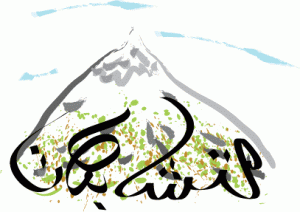Have a Question? Follow the Connections

As you’ve read the Quran, many questions likely crop up. What should you do when you have yourself an unanswered question? The answer is simple. Ask God to help you find the answer, and patiently apply your own effort in its search.
A verse that always puzzled me was the one in Surah 2 saying that the fuel for the Fire is “men and stones” (2:24). After reading this for a while, the thought came up, “What did stones do to deserve being in the Fire?” This is really a sincere question and wasn’t meant to be difficult or nitpicky. It is sincere because everything created worships the Creator, even stones, although their worship is in a language that we don’t understand:
Do you not see that everything in the heavens and everything on the earth bows down to God in worship: the sun, the moon, and the stars; the hills, trees, and animals; and multitudes from among mankind? But multitudes are (also) deserving of Punishment. Whomever God disgraces none can ennoble. Indeed, God does whatever He wills (22:18).
The seven heavens and the earth and all beings within sing His glory. There is not a thing but celebrates His praise, yet you do not understand how they praise Him. He is indeed Forbearing, Ever-Forgiving (17:44).
So everything, even stones, really does worship the Creator. Then why are they in the Fire?1
Whenever you’ve got a question about a verse, ask the Creator for the answer, then start searching through his glorious book. He always answers!2 And since the whole of the Quran is connected, the answers are always in other verses. Let’s keep reading to find our answer!
Some verses after 2:24, we find 2:74 saying, the hearts of the ungrateful are “hardened like stones—nay, they are much harder.”3 Did you notice what just happened? Read on! The verse continues:
For there are some stones from which rivers gush forth, others that split and water comes forth, and others that sink from fear of God. And God is not heedless of your behavior (2:74).
God just defended the sanctity of stones! Have you seen this formula before? First, God compares ungrateful people to something in his creation that seems insignificant, then says, “Nay, the ungrateful are even worse.” Check out this verse where he defends cattle:
We have indeed multiplied many Jinn and men for Hell: they have hearts by which they do not understand, eyes by which they do not see, and ears by which they do not hear. They are like cattle, nay they are more astray. Those are the heedless (7:179).
Although God defends stones and cattle, the question remains: there aren’t cattle in Hell, so why are there stones?
Here’s a magnificent—and somber—answer. When describing the Day of Judgement and the state of the ungrateful who rejected goodness and truth, verse 14:43 says:
Rushing forward with their heads stretched out, their gaze does not return to them and their hearts are a void (14:43)!
Let’s make the connections! Those who rejected truth have hearts harder than stones (2:24). Now we read here that there is a hole, a void, where their hearts are. What do you conclude? Don’t read the next paragraph until you’ve thought about it for yourself. You may have come to a different conclusion than me 🙂
The holes in their chests are what remain after their hearts of stone were removed and used as fuel for the Fire. Subhaan Allah. Real rocks are not in the Fire because they are magnificent creations of God that sing his praises. The stones that are in the Fire are the hardened hearts of the ungrateful.
This is a somber topic, yet the beauty and coherence of the Quran never ceases to amaze! All praise is due God, Lord of the universe 🙂
Footnotes:
1. Many commentators say these stones are remnants of idols that people used to worship. Others say that it represents the materialism that the ungrateful used to worship. Neither of these interpretations are totally satisfying because even stones that were part of idols weren’t guilty of worshiping them. They still worshiped God although they were misused.
2. God promises to answer us, but we have to do our part:
And when my servants ask you of me, tell them I am very near. I answer their call when they call upon me. So let them respond to me and have faith in me so they may be rightly guided (2:186).
3. The word kaafiroon used in this verse comes from the same root as kufr. It was translated as “ungrateful people.” This word’s root means many things: to hide or cover something, as a farmer does to a seed in the ground, to hide the truth of a thing, to reject, and to be ungrateful. If you have never heard of kufr being translated as ingratitude, here’s a great verse showing this usage clearly. Verse 14:7 presents shukr, or thankfulness, and kufr as opposite acts. Since shukr means gratitude, kufr best takes the meaning of ingratitude here.
